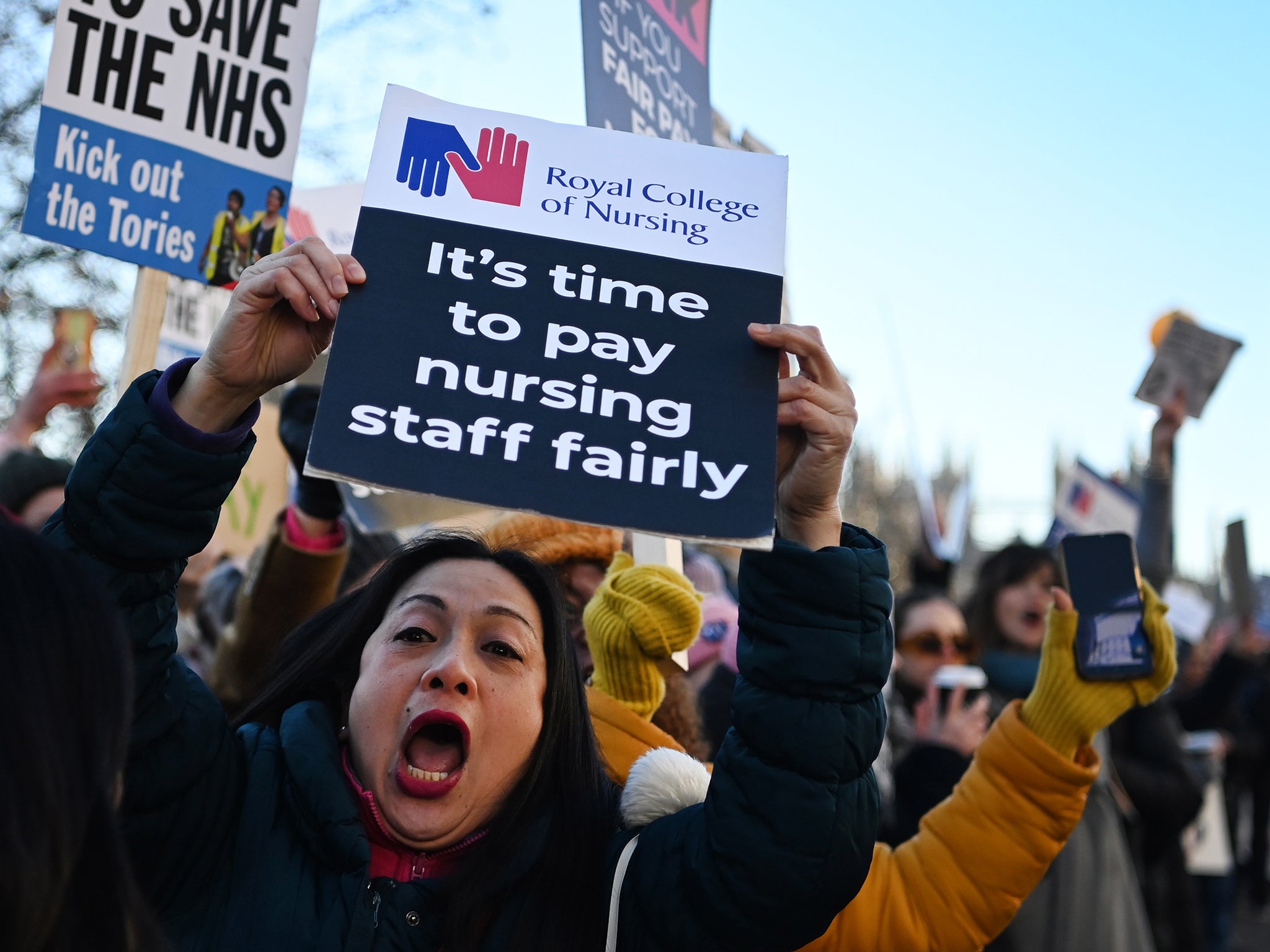Steve Barclay ‘holding country to ransom’ by refusing to discuss nurses pay, says union boss
Unions won’t ‘blink first’, insists Unite chief – as RCN warns of January strikes if no pay talks
Your support helps us to tell the story
From reproductive rights to climate change to Big Tech, The Independent is on the ground when the story is developing. Whether it's investigating the financials of Elon Musk's pro-Trump PAC or producing our latest documentary, 'The A Word', which shines a light on the American women fighting for reproductive rights, we know how important it is to parse out the facts from the messaging.
At such a critical moment in US history, we need reporters on the ground. Your donation allows us to keep sending journalists to speak to both sides of the story.
The Independent is trusted by Americans across the entire political spectrum. And unlike many other quality news outlets, we choose not to lock Americans out of our reporting and analysis with paywalls. We believe quality journalism should be available to everyone, paid for by those who can afford it.
Your support makes all the difference.Health secretary Steve Barclay has been accused of “holding the country to ransom” by refused to discuss pay ahead of further NHSstrikes.
The health braces for major disruption in the run up to Christmas, with nurses set to walk out on Tuesday and ambulance crews set to start industrial action on Wednesday.
Unite leader Sharon Graham also said Steve Barclay will get a “rude awakening” if he refuses to negotiate on pay, as she insisted the unions will not “blink first” to break the deadlock.
Ms Graham, whose union is co-ordinating the ambulance strikes with Unison and GMB, said he will “have to carry the can if patients suffer”.
“It’s Steve Barclay who is holding the country to ransom,” she told The Mirror.
The Royal College of Nursing (RCN) has vowed to stage a fresh wave of more severe strikes in January if ministers are not prepared to open talks in the 48 hours after its members walk out on Tuesday.
The health secretary has signalled he is “keen” to pursue further talks – but Mr Barclay has continued to resist calls to negotiate on pay, instead suggesting discussions focus on a range of other issues.
Mr Barclay said the union, which is calling for an inflation-busting wage hike, should respect the independence of the NHS pay review body that proposed the current offer.
He insisted the RCN’s calls for a 5 per cent rise above inflation were “not affordable”, stressing the need for a “balance” reflecting taxpayer constraints during a cost-of-living crisis.
He also refused to be drawn on reports No 10 had ruled out a one-off payment for nurses to end the stalemate, instead reiterating the government’s position that it has accepted the pay review body’s recommendations “in full”.
Unison general secretary Christina McAnea said it would require a "firm commitment" on pay for the unions to call off their strike action on Wednesday.
The union leader said ambulance staff are taking industrial action because ministers refused to negotiate with them on pay.
“This isn’t something they have chosen to do lightly – the government has been completely intransigent here,” she told BBC Radio 4’s Today programme.
Ahead of a fresh Cobra meeting of top officials on Monday, Cabinet Office minister Oliver Dowden said it is “not fair” that armed forces personnel are having to cover for striking workers over the festive period.
Urging unions to “give the military a break this Christmas”, Mr Dowden said in cases of less serious injuries, people should make their own way to hospital on Wednesday.
Ambulance workers, including paramedics and call handlers, are due to strike on Wednesday. A second ambulance strike is scheduled for December 28.
Mr Dowden who chaired two Cobra meetings on the issue last week, said ministers would remain “resolute” in their stance on public sector pay despite nurses threatening further walkouts in the new year.

Interim chief executive of NHS Providers Saffron Cordery told BBC Breakfast that negotiations are continuing nationally and locally between ambulance services and trust leaders to work out what should be exempt from strike action.
Asked if people should make their own way to hospital on Wednesday, she said: “If someone has a life and limb emergency, they should call 999. And if it’s not that kind of emergency, they will be told to seek different advice.”
Older people set to be sent home could be “trapped” in hospital over Christmas because of the strikes, an unnamed NHS official told The Telegraph.
Faced with impending disruption, the government has announced controversial plans to deploy 1,200 troops to cover for striking ambulance drivers and Border Force staff, alongside more than 1,000 civil servants.
Unions have branded the move a “desperate measure”, warning the servicemen and women are not “sufficiently trained” to plug staffing gaps on the front line.
It comes as the Chief of the Defence Staff has said the armed forces should not be treated as “spare capacity”.
Meanwhile, Border Force staff will walk out for eight days from 23 December until New Year’s Eve while rail workers are preparing to strike again on Christmas Eve.




Join our commenting forum
Join thought-provoking conversations, follow other Independent readers and see their replies
Comments